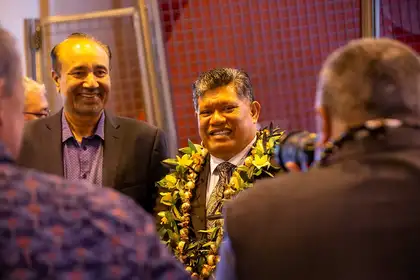
Massey Dean Pacific Professor Palatasa Havea (right) with Distinguished Professor Harjinder Singh.
Growing up in Tonga, Tasa Havea described himself as “a nutter” at school. He enjoyed fishing and gardening to support his large family but educationally he wasn’t a patch on his nine siblings. “I was really bad at school; I was just too dumb.”
But his father firmly believed that education was the path out of poverty for his children.
He spent three years in the fourth form at secondary school in Vava’u in northern Tonga after twice failing the end-of-year exam. Eventually he made it to the fifth form but failed to make it to the sixth until moving to Nuku’alofa, where he convinced Tupou High School he had in fact passed his fifth form exam and was admitted to the sixth form. Finally, he thrived after an inspirational teacher had taken an interest in encouraging him.
After working for three years for the Tonga Commodities Board in a factory that produced desiccated coconut, tomato sauce and juices he was chosen to go to New Zealand to study food technology at Massey.
It was 1986 and he was 26. “I’d never seen a computer.” He was one of five Pacific students in his year and at that time there was no specific support in place. In what was a repeat of his earlier school experience, things did not go well. “I did really badly when I started…I was told to go away. I was too dumb.”
He recalls being in a computer lab having to use a spreadsheet and confessing to the lecturer he had no idea what was going on. He was later called into the professor’s office where he was handed a note from the lecturer essentially saying he was not going to succeed and should leave.
But Tasa Havea was determined to stay and by the second year was the only one of the five Pacific students left on the course. “I was the only nutter who stayed.”
The professor who handed him the note, Mary Earle, later became a mentor and encouraged him on through to a master’s degree in food technology – the only one in his year to get first-class honours – and then a PhD, supervised by Distinguished Professor Harjinder Singh.
Today Professor Havea is back at Massey in a new role as Dean Pacific after a 22-year research career at Fonterra and its predecessor, the New Zealand Dairy Board. On Friday last week he was formally welcomed with a pōwhiri at the Manawatū campus.
Shaped by his own experiences, he has big plans to find ways to not only increase Pacific student numbers at Massey but also to increase the grades, the pass rates and the subsequent success of those graduates in their careers.
He says Professor Earle (now Professor Emeritus) set up a paper specially for him. “She got me to write essays because she believed I was not dumb it was more that I don’t really know how to portray my ideas in writing…that’s when I started to realise the importance of writing and that’s when I started to do research.
“When I did my PhD things took off from there. I loved research.” He says Professor Singh’s “brilliant mind” was also inspirational. “His mastery of writing and strategic approach to problem solving made it an awesome experience to study under his guidance.”
He says what works for most Pacific students and staff is a collective approach. “They work as a group. You win one; you win the rest.
“We want to build a culture of fun and hard work in a communal way. If you create that kind of culture for them that they walk in this door and have the willingness to learn, you know that would be really something.”
One of the initiatives is to create café learning hub spaces in south Auckland where distance students can meet to study. “Students in isolation are more vulnerable to failing.”
Another is to increase scholarships in science and technology where Pacific students are under-represented and revise and update the Growing Pearls of Wisdom strategy published in 2010 and last updated four years ago.
Still in the planning stage would be a strategy that aims to harness the natural ability Pacific peoples have with performance art, something he is keen to develop further before revealing too much detail.
My vision is far more than just passing exams. I want our students to have a global view of their potential. The reality is the Pacific Islands is a goldmine in terms of intellectual properties and cultures and research. There are a lot of people overseas, top professors because they write about our stories, and that is because we ourselves don’t see the importance of our own work.”
What many who attended the pōwhiri were hugely impressed by was the singing by those who arrived to support Professor Havea.
He says there was no invitation extended to most of those who came, just word of mouth that the powhiri was happening and they said they were coming. “Not just Tongans, there were Samoans, Fijians, Niueans, the Cook Islanders, they turned up because they knew the Pacific Dean was having a pōwhiri. I had to explain [to the organisers] this text [message] is not asking for permission, they are coming.”